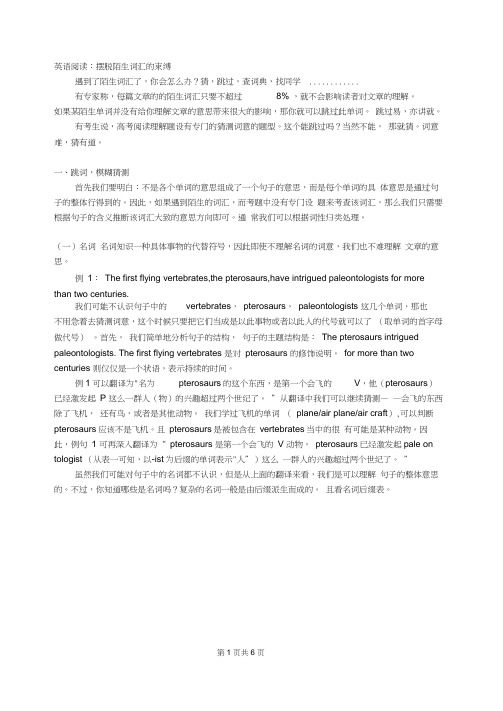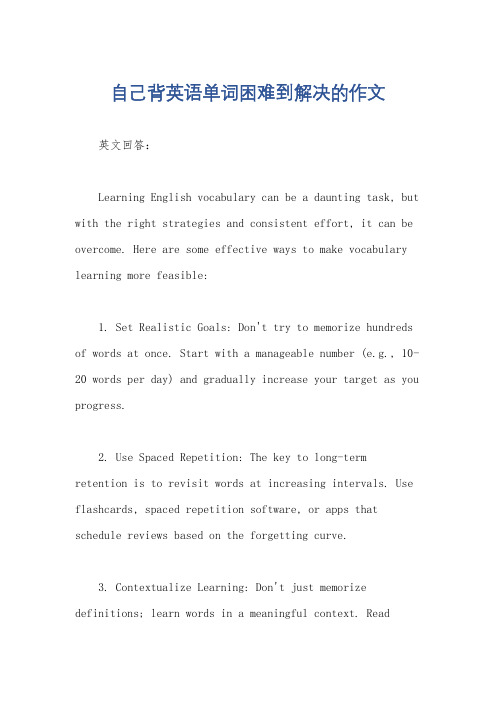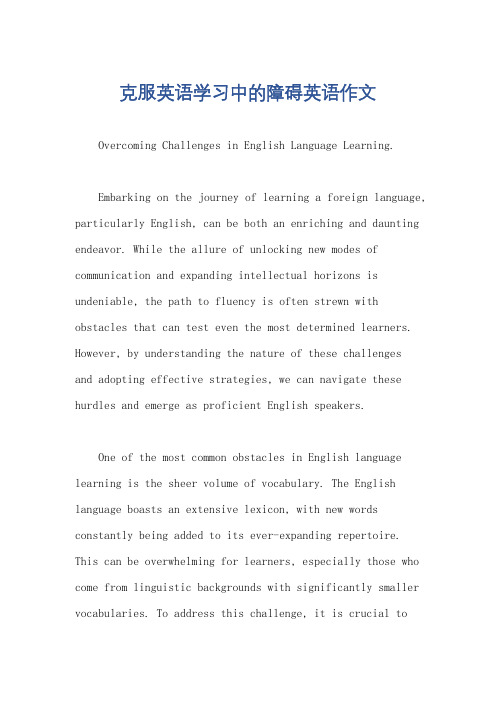英语-摆脱陌生词汇的束缚文章
摆脱束缚的议论文800字5篇

摆脱束缚的议论文800字5篇摆脱束缚的议论文800字精选篇1我们还年小的时候,听到最多的话,就是父母。
老师的唠叨,认真读书是我们追求的目标,也在大人的嘴边常常挂着。
而也就是这个词夺走了我们童年的欢乐,谁可曾去追求过自由呢?在学校里,如果你是一个成绩优异的学生,就是老师喜爱的好学生,父母也会常常夸奖你,同学们就会围着你转;如果你是一个成绩差的学生,在老师家长的眼里你就是一个坏学生、是个没出息,一无是处的学生,同学们讥笑你、歧视你。
可见成绩在大人的眼里是多么重要啊!是啊!每当夜深人静,路灯是那么微弱时,学生们还在埋头苦读书,他们常常废寝忘食。
每当考试卷子发下来时,考得差的学生无地自容,考得好的学生就成了大家羡慕的耀眼的明星。
分数也决定了谁被批评,谁被夸奖。
如果你受到分数的青睐,你就会无比自豪;但是你如果受到分数的冷落,你会立即在别人的眼里变成一个笨蛋。
我就是一个典型的例子:我原来的成绩在班上名列前茅,可是在一次考试中因为粗心大意从而使成绩考差了,回到家被爸爸妈妈批评了一顿,我本来就很伤心了,本以为能在爸爸妈妈这里得到一点点安慰、鼓舞。
可是没想到爸爸妈妈却把我狠狠的骂了一顿。
从此我以后意志消沉,考试成绩一次比一次差,爸爸妈妈批评得一次比一次狠,老师也“抛弃”了我,同学遗弃我,我伤心透了,我好恨分数是它让我变成一个笨蛋我也恨爸爸妈妈!我有时都在怀疑我是他们的女儿吗?难道分数才是他们的女儿!自由是每个与生俱来的权利,我们都有权享有他,所以在你被束缚的时候,就该去追求你的自由。
摆脱束缚的议论文800字精选篇2如果地球失去引力,我就会变成流星,无依无附在天宇飘行——这样无节制的自由不具任何吸引力;为了拒绝这种“自由”,我愿变成一段树根,深深扎进地层——绝对的自我束缚同样无趣,只会浪费生命。
而我,会再扎进地层后,汲取养分、积极生长,长出强壮枝干、繁茂树叶,以最稳固的姿态立于地球,再次仰望星空,却不再惊恐。
深扎土中是束缚,破土而出是挣脱束缚、追求自由,亭亭如盖是在束缚中找到了自由。
摆脱的英语单词

摆脱的英语单词摆脱,指冲破束缚和障碍而获得自由的意思。
那么你知道摆脱的英语单词是什么吗?下面来学习一下吧。
摆脱英语单词1:rid摆脱英语单词2:cast off摆脱的英语例句:由我来负责摆脱他们。
It fell to me to get rid of them.我们趁黑摆脱了追踪的人。
We managed to lose our pursuers in the darkness.他这人真讨厌!我很庆幸能摆脱他的纠缠。
He was a boring nuisance! I'm glad to be rid of him.他终于摆脱了这么一项乏味的工作。
He was able to cast off such an uninteresting task.他善於随机应变,总能摆脱追踪他的人。
Thanks to agile footwork he always managed to escape his pursuers.摆脱他,我们将很高兴。
We will be glad to get rid of him.摆脱了碳水化合物,你就摆脱了多余的重量。
Omitting carbs from your diet can help you drastically drop the unwanted pounds.即使我们能摆脱摩擦,我们也不想完全摆脱摩擦。
We would not want to get rid of friction entirely even if we could get rid of it.男子运行迅速摆脱它。
Men running swiftly emerged from it.她是为了摆脱农村贫苦的生活而结婚的。
She married to get away from her miserable country life.摆脱他,我们将很高兴。
We will be glad to get rid of him.上周,为了摆脱垃圾搜索结果的困扰,谷歌(Google)调整了其搜索算法。
自己背英语单词困难到解决的作文

自己背英语单词困难到解决的作文全文共3篇示例,供读者参考篇1Learning English Vocabulary: My Struggle and How I Overcame ItAs an non-native English speaker, learning vocabulary has been one of the biggest hurdles in my journey to mastering the English language. I still remember the overwhelming feeling of staring at endless lists of unfamiliar words, desperately trying to commit them to memory, only to forget them a few days later. It was a frustrating and demoralizing experience that made me question my ability to learn English.In the beginning, I tried traditional rote memorization techniques, like writing words repeatedly or using flashcards. While these methods worked for some, they didn't suit my learning style. I found myself easily distracted and bored, constantly having to re-learn words I thought I had already mastered. It was a vicious cycle that left me feeling discouraged and unmotivated.Thankfully, I didn't give up. I realized that I needed to find a more engaging and effective way to learn vocabulary. That's when I discovered the power of context and immersion.The first step I took was to surround myself with English as much as possible. I started watching movies and TV shows in English with subtitles, listening to podcasts and music, and reading books and articles on topics that interested me. At first, it was overwhelming, and I found myself constantly reaching for the dictionary or pausing to look up unfamiliar words. But gradually, I began to notice patterns and connections between words, and their meanings became more apparent in context.One of the most helpful techniques I developed was keeping a vocabulary journal. Whenever I encountered a new word that caught my attention, I would write it down, along with its definition, a sample sentence, and any relevant notes or associations that could help me remember it better. For example, if the word was "serendipity," I might associate it with a happy coincidence or a fortunate accident. By creating these personal connections, the words became more than just random combinations of letters – they took on deeper meaning and stuck in my mind more easily.Another game-changer for me was using spaced repetition software like Anki. This allowed me to review vocabulary at carefully timed intervals, reinforcing the words I struggled with and gradually expanding my knowledge. The software's algorithm ensured that I focused on the words I needed to work on the most, maximizing my study time and preventing me from wasting effort on words I had already mastered.In addition to these techniques, I also tried to incorporate new vocabulary into my everyday life. I made an effort to use the words I was learning in conversations, writing assignments, and even my personal journal entries. This active recall and application helped solidify the words in my long-term memory and made them feel more natural and relevant.Of course, there were still moments of frustration and setbacks along the way. Some words stubbornly refused to stick, and there were times when I felt like I was making little to no progress. However, I learned to be patient and persistent, reminding myself that language learning is a marathon, not a sprint.One of the most valuable lessons I learned was the importance of not beating myself up over mistakes or perceived failures. I realized that making errors was a natural part of thelearning process, and instead of getting discouraged, I should embrace them as opportunities to learn and grow.As I continued on this journey, something remarkable happened – my confidence in using English vocabulary grew exponentially. Words that once seemed daunting and incomprehensible became familiar friends, and I found myself able to express myself more eloquently and precisely. This newfound confidence extended beyond just vocabulary; it permeated all aspects of my English language skills, from reading comprehension to writing and speaking.Looking back, I can't help but feel a sense of pride and accomplishment. Learning English vocabulary was one of the biggest challenges I faced, but by finding techniques that resonated with my learning style and persevering through the struggles, I overcame it. The journey wasn't easy, but it taught me valuable lessons about perseverance, adaptability, and the power of embracing different learning strategies.Today, when I encounter a new English word, I no longer feel the same sense of dread or frustration. Instead, I see it as an opportunity to expand my knowledge and deepen my understanding of this rich and nuanced language. While I know that there will always be more words to learn, I feel equippedwith the tools and strategies to tackle them head-on, confident in my ability to conquer any linguistic challenge that comes my way.篇2Mastering the Maze of English Vocabulary: A Student's OdysseyAs a student grappling with the intricacies of the English language, the task of memorizing vocabulary has been an uphill battle that has tested the limits of my perseverance and intellectual prowess. From the onset of my linguistic journey, I found myself entrapped in a labyrinth of unfamiliar words, each one a stumbling block that threatened to derail my progress.The sheer vastness of the English lexicon was a daunting prospect, akin to navigating a dense forest without a compass. With each new lesson or reading assignment, a torrent of new vocabulary would inundate my mind, leaving me floundering in a sea of definitions and pronunciations. It was as if the universe had conspired to taunt me, bombarding me with an endless barrage of words that seemed to defy memorization.In those early days, my study sessions resembled a battleground, with flashcards strewn across my desk like fallensoldiers. I would meticulously scribble down words, their meanings, and their phonetic transcriptions, only to find myself staring blankly at them a few hours later, the information having evaporated from my mind like morning dew in the afternoon sun.Frustration mounted as I witnessed my peers effortlessly mastering vocabularies that eluded my grasp. I couldn't fathom how they could retain such an avalanche of information, while I struggled to recall even the most basic of terms. It was a humbling experience that threatened to erode my confidence and shake the very foundations of my linguistic aspirations.Yet, in the midst of this tempestuous journey, a glimmer of hope emerged. I realized that my struggles stemmed not from a lack of intellectual capacity, but from an ineffective approach to memorization. It was then that I embarked on a quest to unravel the secrets of effective vocabulary acquisition, determined to conquer the linguistic Everest that loomed before me.My first breakthrough came when I embraced the power of mnemonics – those ingenious memory aids that transform abstract words into vivid mental images. Suddenly, theonce-elusive "abrogate" became a mental picture of a robot tearing up a contract, and "soporific" conjured visions of aslumbering opossum. By anchoring these words to tangible visuals, I found that they adhered to my memory with greater tenacity.Buoyed by this newfound strategy, I delved deeper into the realms of memory enhancement techniques. I discovered the virtues of spaced repetition, a method that involved revisiting words at strategic intervals to reinforce their retention. Gone were the days of cramming vocabulary lists in marathon sessions; instead, I embraced a more measured approach, allowing the words to etch themselves into my long-term memory through consistent reinforcement.Parallel to these tactics, I also learned to harness the power of context. Rather than treating words as isolated entities, I began to study them within the rich tapestry of sentences and passages. By observing how they were employed in various contexts, I gained a deeper understanding of their nuances and connotations, further solidifying their place in my mental lexicon.As my vocabulary arsenal expanded, so too did my confidence in expressing myself through the written and spoken word. I found myself engaging in discourse with a newfound eloquence, seamlessly weaving in words that had once been foreign to me. Each successful retrieval and application of apreviously elusive term was a small victory, a testament to the resilience and adaptability of the human mind.Yet, the journey was not without its setbacks. There were days when the words seemed to slip through the cracks of my memory, evading my best efforts at recall. In those moments, I learned the value of perseverance, pushing through the frustration and recommitting myself to the task at hand. After all, mastering a language is a marathon, not a sprint, and stumbles along the way are inevitable.As I reflect on this odyssey, I am struck by the profound impact it has had on my personal growth. Beyond the linguistic gains, I have cultivated a deeper appreciation for the art of learning itself. I have come to understand that true mastery lies not in the accumulation of knowledge, but in the ability to adapt one's approach, to experiment with different strategies, and to embrace the challenges that arise along the way.With each word committed to memory, I have chipped away at the barriers that once stood between me and fluency in the English language. The maze of vocabulary that once seemed impenetrable has gradually yielded to my persistence, revealing a path towards greater self-expression and intellectual enrichment.While the journey is far from over, and new linguistic frontiers await exploration, I embark upon them with a newfound confidence born of hard-won victories. The struggles I endured in mastering English vocabulary have imparted invaluable lessons – lessons in resilience, creativity, and the indomitable power of the human spirit to conquer even the most formidable of challenges.So, to my fellow students grappling with the intricacies of language acquisition, take heart. The road may be arduous, but the rewards that await at the end are immeasurable. Embrace the struggles, for they are the crucible in which true mastery is forged. And never underestimate the transformative power of a single word, for within each one lies the potential to unlock new realms of understanding and self-expression.篇3Memorizing Vocabulary: A Daunting Task ConqueredAs an English language learner, one of the biggest hurdles I've faced is the seemingly endless list of vocabulary words to memorize. When I first started learning English, the sheer number of new words overwhelmed me. I remember staring atpages upon pages of unfamiliar terms, feeling like I was trying to climb a mountain without any gear.In the beginning, I tried various methods to commit these words to memory, but none of them seemed to stick. I would spend hours making flashcards, only to forget the words a few days later. I tried associating words with images, but my mind would often wander, and the connections would slip away. It was like trying to hold water in my cupped hands – no matter how tightly I tried to grasp the words, they would always trickle out.Frustration began to set in, and I contemplated giving up on learning English altogether. How could I possibly remember thousands of words when I couldn't even retain a handful? I felt like a failure, and the mountain of vocabulary seemed more insurmountable than ever.But then, something shifted. I realized that the key to mastering vocabulary wasn't just about rote memorization; it was about finding a method that worked for me personally. I started experimenting with different techniques, and slowly but surely, I began to find my stride.One approach that helped immensely was incorporating the words into my daily life. Instead of just staring at lists, I made an effort to use the new words in conversations, journal entries, andeven in my thoughts. By actively using the words, they became ingrained in my mind, like well-worn paths in a forest.I also discovered the power of context. Rather than memorizing words in isolation, I started learning them within the framework of sentences and phrases. This helped me understand not only the definitions but also the nuances and appropriate usage. It was like learning a language within a language, and the words suddenly had more depth and meaning.Another game-changer was finding ways to make the process enjoyable. I started watching English movies and TV shows, reading books and articles on topics that interested me, and even listening to music in English. By immersing myself in the language, I was unknowingly absorbing new vocabulary while engaging in activities I genuinely enjoyed.Of course, there were still days when I felt discouraged, when the words seemed to slip through my fingers like sand. But I learned to embrace these setbacks as part of the journey. I reminded myself that language learning is a marathon, not a sprint, and that every stumble was an opportunity to reevaluate my approach and try something new.As time passed, I noticed a remarkable transformation. Words that had once been indecipherable hieroglyphs nowrolled off my tongue with ease. Conversations that had once been stilted and awkward now flowed smoothly, like a river carving its way through a canyon.But more than just the practical benefits, mastering vocabulary has enriched my life in ways I never imagined. Each new word is like a key, unlocking doors to different cultures, perspectives, and ways of thinking. It's like being given a pair of glasses that brings the world into sharper focus, allowing me to see nuances and subtleties that had previously been blurred.And perhaps most importantly, overcoming the challenge of vocabulary has instilled in me a sense of resilience and determination. If I can conquer something as daunting as memorizing thousands of words, what else can I achieve? The mountain that once seemed unconquerable is now a testament to my perseverance and dedication.As I continue on my language-learning journey, I know that there will be new challenges and obstacles to face. But armed with the strategies and mindset I've developed, I feel confident in my ability to tackle them head-on. The path may be winding and sometimes treacherous, but with each step, I become stronger, more resilient, and more equipped to navigate the terrain.So, to any fellow language learners out there feeling discouraged or overwhelmed by the task of vocabulary acquisition, take heart. Embrace the struggle, for it is in overcoming these challenges that we truly grow and develop as learners and as individuals. The mountain may seem high, but with the right tools and mindset, it is entirely within reach.。
英语-摆脱陌生词汇的束缚文章

英语阅读:摆脱陌生词汇的束缚遇到了陌生词汇了,你会怎么办?猜,跳过,查词典,找同学 ............有专家称,每篇文章的的陌生词汇只要不超过8% ,就不会影响读者对文章的理解。
如果某陌生单词并没有给你理解文章的意思带来很大的影响,那你就可以跳过此单词。
跳过易,亦讲就。
有考生说,高考阅读理解题设有专门的猜测词意的题型。
这个能跳过吗?当然不能,那就猜。
词意难,猜有道。
一、跳词,模糊猜测首先我们要明白:不是各个单词的意思组成了一个句子的意思,而是每个单词的具体意思是通过句子的整体行得到的。
因此,如果遇到陌生的词汇,而考题中没有专门设题来考查该词汇,那么我们只需要根据句子的含义推断该词汇大致的意思方向即可。
通常我们可以根据词性归类处理。
(一)名词名词知识一种具体事物的代替符号,因此即使不理解名词的词意,我们也不难理解文章的意思。
例1:The first flying vertebrates,the pterosaurs,have intrigued paleontologists for morethan two centuries.我们可能不认识句子中的vertebrates,pterosaurs,paleontologists 这几个单词,那也不用急着去猜测词意,这个时候只要把它们当成是以此事物或者以此人的代号就可以了(取单词的首字母做代号)。
首先,我们简单地分析句子的结构,句子的主题结构是:The pterosaurs intrigued paleontologists. The first flying vertebrates 是对pterosaurs 的修饰说明。
for more than two centuries 则仅仅是一个状语,表示持续的时间。
例1可以翻译为"名为pterosaurs的这个东西,是第一个会飞的V,他(pterosaurs)已经激发起P 这么一群人(物)的兴趣超过两个世纪了。
英语口语文章短文

英语口语文章短文口语是语言存在的基本形式,是在日常交际的情况下所使用的语言。
随着中国外贸的迅速发展,当今国际贸易活动日益频繁,对英语尤其是英语口语的要求越来越高。
店铺整理了英语口语文章短文,欢迎阅读!英语口语文章短文篇一As we slowly drove down the street on that cold December evening we spotted the porch light. "This must be the house." I told our "Positive Teens In Action" group. We pulled up in front of an older home with the porch light glowing. We gathered up our song books, walked up the steps, and knocked on the door. We heard a faint voice from inside say, “Come on in. The door is open." We opened the door.在那个寒冷的12月份的夜晚我们开车在路上慢慢行驶时看到了门廊的灯光,我跟我们这个“积极行动的青年小队”说:“一定就是这家了。
”我们把车停在一栋旧房子前,门廊灯光很亮。
我们拿出歌集,走上台阶敲了敲门,听到里面传来一个虚弱的声音:“进来吧,门开着呢”,我们推开了门。
There in a rocking chair sat an elderly woman with a big smile on her face. "I've been expecting you." she said weakly. Ruth was one of our Meals On Wheels stops I had arranged; along with the usual church members who enjoyed carolers. We handed Ruth the basket of goodies the teens had assembled earlier that evening. Then I asked Ruth what carols she would like to hear. Ruth's face was beaming as she joined in singing each song.摇椅上坐着一位老太太,脸上带着灿烂的笑容,她虚弱地说:“我一直盼着你们来。
自己背英语单词困难到解决的作文

自己背英语单词困难到解决的作文英文回答:Learning English vocabulary can be a daunting task, but with the right strategies and consistent effort, it can be overcome. Here are some effective ways to make vocabulary learning more feasible:1. Set Realistic Goals: Don't try to memorize hundreds of words at once. Start with a manageable number (e.g., 10-20 words per day) and gradually increase your target as you progress.2. Use Spaced Repetition: The key to long-termretention is to revisit words at increasing intervals. Use flashcards, spaced repetition software, or apps that schedule reviews based on the forgetting curve.3. Contextualize Learning: Don't just memorize definitions; learn words in a meaningful context. Readbooks, articles, and news in English to encounter words in their natural usage.4. Make It Interactive: Engage with the words bywriting sentences, using them in conversations, or creating mind maps. Active recall strengthens memory and makes learning more enjoyable.5. Use Visual Cues: Utilize images, diagrams, or videos to associate words with visual representations. This helps improve memory and comprehension.6. Break Down Complex Words: Divide large or unfamiliar words into smaller chunks or roots. This makes them easier to understand and recall.7. Group Related Words: Organize words into categories(e.g., synonyms, antonyms, vocabulary related to a specific topic) to enhance memorization and retrieval.8. Seek Professional Help: If you're struggling with vocabulary learning, consider consulting a language tutoror taking a structured English course. They can provide guidance, support, and tailored materials.9. Be Patient and Consistent: Vocabulary acquisition takes time and effort. Don't get discouraged if you don't see results immediately. Keep practicing consistently and you will eventually master the English vocabulary.10. Make It Fun: Find ways to make vocabulary learning enjoyable. Use games, quizzes, or online platforms that offer interactive and engaging activities.中文回答:1. 设定切合实际的目标。
解脱的英文单词

解脱的英文单词解脱,这个词汇最初是来自佛教语境。
在佛教中,解脱指的是从轮回中解脱出来,不再受到生死的束缚。
但是在日常生活中,解脱的含义也十分丰富,可以理解为走出困境,摆脱束缚,释放压力等等。
那么,在英语中,该如何表达解脱呢?以下列举了几个常见的表达方式。
1. Relief这个词汇的意思是“解除,解脱”,可以指解除某种疼痛,也可以指从某种困境中解脱出来。
例如:The relief of finally passing the exam was overwhelming.(终于通过考试的解脱感让人无比欣喜)。
2. Liberation这个词汇的意思是“解放,解脱”,可以指从某种限制中解放出来,也可以指摆脱某种束缚。
例如: The liberation of the prisoners was a momentous occasion.(释放囚犯是一个具有重大意义的时刻)。
3. Freedom这个词汇的意思是“自由,解放”,可以指从某种束缚中获得自由,也可以指摆脱某种限制。
例如:The freedom to travel is a cherished right in many countries.(旅行自由是许多国家珍视的权利)。
4. Escape这个词汇的意思是“逃脱,解救”,可以指逃脱某种危险,也可以指摆脱某种不愉快的情境。
例如:The escape from the burningbuilding was a miracle.(从着火的大楼逃脱是个奇迹)。
总体而言,解脱是人们渴望的一种状态,可以让人们从压力和焦虑中解脱出来,体验到轻松和愉悦。
无论是在生活中还是工作中,我们都需要不时地为自己创造解脱的机会,让自己的心灵得到舒展和放松。
克服英语学习中的障碍英语作文

克服英语学习中的障碍英语作文Overcoming Challenges in English Language Learning.Embarking on the journey of learning a foreign language, particularly English, can be both an enriching and daunting endeavor. While the allure of unlocking new modes of communication and expanding intellectual horizons is undeniable, the path to fluency is often strewn with obstacles that can test even the most determined learners. However, by understanding the nature of these challengesand adopting effective strategies, we can navigate these hurdles and emerge as proficient English speakers.One of the most common obstacles in English language learning is the sheer volume of vocabulary. The English language boasts an extensive lexicon, with new words constantly being added to its ever-expanding repertoire. This can be overwhelming for learners, especially those who come from linguistic backgrounds with significantly smaller vocabularies. To address this challenge, it is crucial toadopt a systematic approach to vocabulary building. This involves setting realistic daily targets for learning new words, incorporating them into active use through speaking and writing practice, and reviewing them regularly to ensure retention. Utilizing resources such as flashcards, vocabulary apps, and dictionaries can greatly enhance this process.Grammar presents another significant challenge in English language learning. The rules governing sentence structure, verb tenses, and parts of speech can be complex and often differ vastly from those of native languages. This can lead to confusion and errors in speaking and writing. To overcome this challenge, it is essential to understand the fundamental grammar rules and practice applying them consistently. Engaging in grammar exercises, studying grammar books, and seeking feedback from native speakers or qualified teachers can significantly improve grammatical accuracy.Pronunciation can also be a major obstacle for English learners. The English language features a wide range ofvowel and consonant sounds, some of which may not exist in the learner's native language. This can make it difficult to produce English words and sentences accurately and fluently. To improve pronunciation, it is helpful to listen attentively to native speakers, practice speaking aloud, and receive feedback on pronunciation errors. Utilizing pronunciation guides, such as those found in dictionaries or online resources, can also be beneficial.In addition to linguistic challenges, psychological factors can also hinder English language learning. Fear of making mistakes, lack of confidence, and negative self-talk can paralyze learners and prevent them from reaching their full potential. To overcome these psychological barriers,it is important to cultivate a positive mindset. This involves setting realistic goals, focusing on progress rather than perfection, and seeking support from others who are also learning English.Cultural differences can also pose challenges in English language learning. Language is deeply intertwined with culture, and understanding the cultural context ofEnglish can help learners better grasp the nuances of the language. This involves learning about English-speaking countries, their customs, values, and ways of thinking. Engaging with English-language media, such as films, television shows, and newspapers, can provide valuable insights into English-speaking cultures.Finally, lack of motivation can be a significant obstacle in English language learning. Staying motivated over the long term requires intrinsic drive and a clear understanding of the benefits of learning English. Setting personal goals, such as improving career prospects or traveling to English-speaking countries, can help maintain motivation. Additionally, finding a language partner, joining a language learning group, or attending English language events can provide social support and keep learners engaged.Overcoming the challenges in English language learning is an ongoing process that requires dedication, perseverance, and a willingness to embrace challenges. By understanding the nature of these obstacles and adoptingeffective strategies, learners can navigate these hurdles and achieve their goals of English language fluency.。
- 1、下载文档前请自行甄别文档内容的完整性,平台不提供额外的编辑、内容补充、找答案等附加服务。
- 2、"仅部分预览"的文档,不可在线预览部分如存在完整性等问题,可反馈申请退款(可完整预览的文档不适用该条件!)。
- 3、如文档侵犯您的权益,请联系客服反馈,我们会尽快为您处理(人工客服工作时间:9:00-18:30)。
英语阅读:摆脱陌生词汇的束缚
遇到了陌生词汇了,你会怎么办?猜,跳过,查词典,找同学......
有专家称,每篇文章的的陌生词汇只要不超过8%,就不会影响读者对文章的理解。
如果某陌生单词并没有给你理解文章的意思带来很大的影响,那你就可以跳过此单词。
跳过易,亦讲就。
有考生说,高考阅读理解题设有专门的猜测词意的题型。
这个能跳过吗?当然不能,那就猜。
词意难,猜有道。
一、跳词,模糊猜测
首先我们要明白:不是各个单词的意思组成了一个句子的意思,而是每个单词的具体意思是通过句子的整体行得到的。
因此,如果遇到陌生的词汇,而考题中没有专门设题来考查该词汇,那么我们只需要根据句子的含义推断该词汇大致的意思方向即可。
通常我们可以根据词性归类处理。
(一)名词
名词知识一种具体事物的代替符号,因此即使不理解名词的词意,我们也不难理解文章的意思。
例1:The first flying vertebrates,the pterosaurs,have intrigued paleontologists for more than two centuries.
我们可能不认识句子中的vertebrates,pterosaurs,paleontologists这几个单词,那也不用急着去猜测词意,这个时候只要把它们当成是以此事物或者以此人的代号就可以了(取单词的首字母做代号)。
首先,我们简单地分析句子的结构,句子的主题结构是:The pterosaurs intrigued paleontologists. The first flying vertebrates 是对pterosaurs的修饰说明。
for more than two centuries 则仅仅是一个状语,表示持续的时间。
例1 可以翻译为“名为pterosaurs的这个东西,是第一个会飞的V,他(pterosaurs)已经激发起P这么一群人(物)的兴趣超过两个世纪了。
”从翻译中我们可以继续猜测——会飞的东西除了飞机,还有鸟,或者是其他动物。
我们学过飞机的单词(plane/air plane/air craft),可以判断pterosaurs应该不是飞机。
且pterosaurs是被包含在vertebrates当中的很有可能是某种动物。
因此,例句1可再深入翻译为“pterosaurs是第一个会飞的V动物,pterosaurs已经激发起paleontologist(从表一可知,以-ist为后缀的单词表示“人”)这么一群人的兴趣超过两个世纪了。
”
这句话当中有很多专业词汇:molecular,peptide hormones,cDNA probes,immunological,purifications tedious,antiserums。
我们通通不认识它们。
此时我们可以将这些词汇全部认定为某个代号,在阅读的过程中布与偶盯着这些词汇看,更不要去猜测其具体词意,知道将橘子的大致意思翻译出来后,单词的模糊词意也呼之欲出。
整体理解例4的句意应该是:molecular的方法是通过使用cDNA probes的方式得到peptide hormones,比另一种immunological的方法要快得多,因为immunological的方法要耗费很多年时间的tedious purifications去分离出peptide hormones,然后再为它们培养antiserums。
二、认识词,清楚猜测
从上述的分析来看,我们完全可以不必因为遇到了几个我们完全没见过的奇形怪状的单词而感到头痛和挣扎。
但是,我们在阅读文章的过程中也常常会碰到这样一些专业词汇,一般是专有名词,它们涉及全文主题,这种词汇我们就必须认识它。
什么事认识呢?从英到汉的翻译是认识吗?还是知道其特征才算认识?我们首先用中文举个最简单的例子——超新星,我们都
能看懂“超新星”这三个字,但是,你知道什么事“超新星”吗?你认识吗?我想很多人应该都不认识。
如果有这样一个英文句子:Supernova is a massive star which undergoes gravitational collapse.你又能从上下文中猜到supernova就是“超新星”吗?相信很多人也是猜不到的。
但是,我们却可以从这个英文句子中知道supernova是巨大的恒星(massive star),它在进行引力收缩(undergoes gravitatinal collapse)。
至此,我们才算认识了supernova,然而,我们还是不一定能知道supernova就是“超新星”。
因此,我们在阅读的过程中遇到不认识的单词,可以在也不用停下来思考单词的释义,也不用费尽思量去猜所谓的单词的中文翻译,我们需要做的知识静下心来找到单词在文章当中传达的特征就可以。
此外,高考阅读额理解喜欢利用句子的前后关系来设提考查我们。
这时候,我们可以找到关系词来判断词汇的意思(不是指中文释义)。
(一)直接反义词
直接反义词——该词前或后出现的内容是反义关系,从中文的
逻辑看会更清楚。
首先,我们举一个中文的例子:我是个______人,相反你是一个内向的人。
从后面的“内向”以及“相反”来看,我们可以推断出前面应该是“外向”之类的词。
在英文当中,我们需要关注的词汇则是:
rather than,instead,unlike contrast,on the contrary,not...but...,but,even so ,however, though, even though ,and yet,but unless,instead等。
例5:The main conflict in the novel is between a mother who place a high value on hard work an honor and a son who repudiates his mother's values instead preferring the easier path to fortune and celebrity.
提问:The word repudiates in the passage in closest in meaning to ()
A.refuses to accept
B.lives up to
C.tries to understand
D.makes the best of
解析:我们可以从后面的小词instead这个词判定儿子和妈妈的价值观念是相反的,由此信息看四个选项,我们会发现只有A选项带有否定的意味。
因此,我们就可以直接选择A项。
(二)并列关系词
并列关系词如下:
and,not noly...but also...,too,as well as,both...and...,either...or,neither...nor等。
丽丽正如我在跳舞,这就是好比美女与_______跳舞。
答案一定是正面的、肯定的“帅哥”,而不是否定的、反而是“野兽”。
例6:She enbarked on her career by working as a newspaper reporter in Wisconsin and soon began writing novels.
提问:The phrase embarked on in this sentence is closest in meaning to ()
A.took a tirp to
B.started out on
C.improved upon
D.had a opinion about
在句子中,我们可以看到关键的表示并列关系的连词and,这就说明and前后是一致的,and后面的began有开始的意思,前面应该也和began有关。
因此本题选择B。
